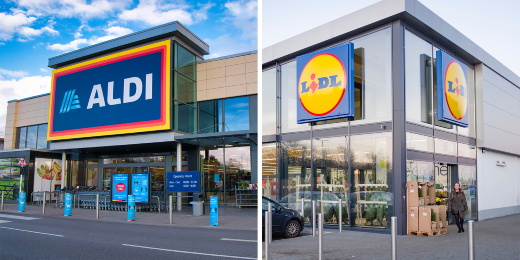Key Takeaways
- Aldi loses cheapest supermarket status in the UK for the first time since 2023, edged out by rival Lidl.
- Lidl’s basket cost £128 with its Plus card, compared to Aldi’s £129.25, according to Which? data.
- Waitrose remains the most expensive supermarket at £170.91 — 33% higher than Lidl.
- Loyalty card pricing increasingly skews price comparisons, altering shopping decisions.
- Food inflation in the UK hit 3.6% in June 2025, fueling shifts in consumer habits and supermarket competition.
For the first time in nearly two years, Aldi loses cheapest supermarket status in the UK. Rival Lidl has narrowly claimed the title, reshaping the competitive landscape as supermarkets lean harder on loyalty card strategies amid unrelenting food inflation.
According to July 2025 price analysis by consumer watchdog Which?, Lidl offered a basket of 76 staple grocery items for £128.00 with a Lidl Plus loyalty card — £1.25 cheaper than Aldi’s total of £129.25. Even without the loyalty discount, Lidl still edged ahead at £128.40.
For shoppers already watching every penny, the fact that Aldi loses cheapest supermarket crown is more than a headline. It signals how marginal differences and loyalty schemes are beginning to redefine the grocery sector’s competitive edge.
Loyalty Cards Drive the New Pricing Battlefield
The shift is being driven not by drastic price changes, but by strategic use of loyalty pricing. Lidl offered discounts on just three items in the 76-item basket, yet it was enough for Aldi to lose its leading position — a move that underscores the power of even minimal pricing tactics in a saturated market.
Tesco and Sainsbury’s leaned more heavily into loyalty pricing, discounting 16 and 15 items respectively via their Clubcard and Nectar schemes. Despite these efforts, neither chain was able to match the baseline affordability of the two discounters.
“Aldi loses cheapest supermarket recognition not because it raised prices significantly, but because Lidl used loyalty pricing more efficiently,” said Rob Mansfield, an independent financial adviser at Rootes Wealth Management. “It’s a classic case of perception overtaking reality.”
Which? noted in its report that “consumers would pay a lot more if they stocked up at Morrisons, Sainsbury’s or Tesco without a loyalty card.” Without loyalty pricing, Tesco’s basket cost £145.10, while Sainsbury’s hit £144.21 even with promotions.
Inflation Drives Consumer Realignment
The supermarket shake-up is unfolding against a backdrop of stubborn food inflation. The Office for National Statistics reported a 3.6% rise in the Consumer Prices Index in June — the highest rate since January 2024 — driven by food and motor fuel prices. That increase outpaced most economist forecasts and further strained household budgets.
Chancellor Rachel Reeves acknowledged the ongoing strain, stating, “I know working people are still struggling with the cost of living. There is more to do, and I’m determined we deliver on our Plan for Change to put more money into people’s pockets.”
The pressure has not gone unnoticed by consumers. A 2024 Which? survey found that 37% of shoppers had changed their primary supermarket in response to rising prices, while nearly half had reduced discretionary spending on non-essentials and treats.
As Aldi loses cheapest supermarket title, the implications are clear: shoppers are recalibrating not only where they buy, but how — leveraging loyalty schemes, tracking promotions, and cross-referencing baskets across chains.
Waitrose Widens Its Premium Gap
While Aldi and Lidl continue to battle over pennies, Waitrose remains on the other end of the spectrum. The upmarket chain posted a July basket price of £170.91 — more than £42 higher than Lidl and 33% above the lowest-cost alternative. Waitrose offered no loyalty card discounts on the listed items.
Asda remained a steady third place, pricing the same basket at £139.53. Though it doesn’t offer loyalty pricing, its consistent performance across months underscores its value proposition for families seeking middle-ground affordability without data exchange.
A second Which? analysis — this time comparing a 192-item branded-only basket — excluded Aldi and Lidl due to limited product overlap. In that exercise, Asda again topped the value chart at £474.12, while Waitrose was 14% more expensive at £538.33.
Pricing Transparency Under Scrutiny
As loyalty schemes reshape price perception, experts have raised questions about transparency and accessibility. While Clubcard or Nectar promotions can yield visible savings, they also create complexity.
“Loyalty pricing blurs transparency,” said Mansfield. “The supermarket that appears cheapest today might not be tomorrow — unless you’re enrolled, opted-in, and scanning.”
This variability challenges traditional comparisons. Although Aldi loses cheapest supermarket status by a small margin, the lack of a loyalty card system arguably preserves its reputation for straightforward pricing. Lidl’s win, meanwhile, suggests that consumers increasingly tolerate — and reward — gamified discounting.
Interest Rate Shift Looms
The economic backdrop could sharpen this divide. The UK economy contracted by 0.1% in May and 0.3% in April, prompting the Bank of England to consider further rate cuts. Analysts expect a 0.25 percentage point reduction this week, bringing the base rate down to 4%.
These moves are meant to relieve household borrowing costs, but the lag in impact may keep supermarket pricing under pressure.
Price is Political — and Personal
Aldi loses cheapest supermarket might seem like a fleeting metric — but in reality, it reflects a broader recalibration. With inflation persistent, growth stagnating, and shoppers actively optimizing every trip, the notion of value is being redefined.
Whether the loss dents Aldi’s market position remains to be seen. But Lidl’s narrow victory suggests that the path to price leadership now runs through algorithms, incentives, and marketing agility — not just supply chain efficiency.
For now, Lidl holds the crown. But as loyalty schemes deepen and economic uncertainty grows, the battle for Britain’s most budget-conscious shoppers is far from over.



